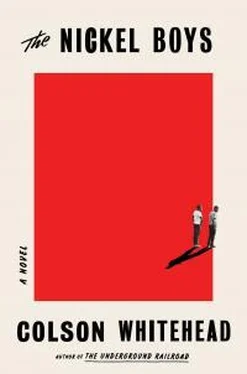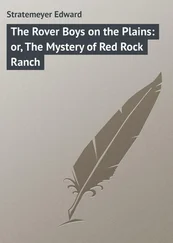Колсон Уайтхед - The Nickel Boys
Здесь есть возможность читать онлайн «Колсон Уайтхед - The Nickel Boys» весь текст электронной книги совершенно бесплатно (целиком полную версию без сокращений). В некоторых случаях можно слушать аудио, скачать через торрент в формате fb2 и присутствует краткое содержание. Год выпуска: 2019, Издательство: Penguin Random House LLC, Жанр: roman, на английском языке. Описание произведения, (предисловие) а так же отзывы посетителей доступны на портале библиотеки ЛибКат.
- Название:The Nickel Boys
- Автор:
- Издательство:Penguin Random House LLC
- Жанр:
- Год:2019
- ISBN:нет данных
- Рейтинг книги:4 / 5. Голосов: 1
-
Избранное:Добавить в избранное
- Отзывы:
-
Ваша оценка:
- 80
- 1
- 2
- 3
- 4
- 5
The Nickel Boys: краткое содержание, описание и аннотация
Предлагаем к чтению аннотацию, описание, краткое содержание или предисловие (зависит от того, что написал сам автор книги «The Nickel Boys»). Если вы не нашли необходимую информацию о книге — напишите в комментариях, мы постараемся отыскать её.
), that the world began to care.
The Nickel Boys — читать онлайн бесплатно полную книгу (весь текст) целиком
Ниже представлен текст книги, разбитый по страницам. Система сохранения места последней прочитанной страницы, позволяет с удобством читать онлайн бесплатно книгу «The Nickel Boys», без необходимости каждый раз заново искать на чём Вы остановились. Поставьте закладку, и сможете в любой момент перейти на страницу, на которой закончили чтение.
Интервал:
Закладка:
The officer told the white boys that they were sitting with a car thief and Bill laughed. “Oh, I used to go joyriding all the time,” he said. “They should have pinched me for that, not some dumb window.”
Outside of Gainesville they drifted off the interstate. The officer pulled over to let everyone piss and gave them mustard sandwiches. He didn’t cuff them when they got back in the car. The officer said he knew they weren’t going to run. He skirted Tallahassee, taking the back road around it like the place didn’t exist anymore. I don’t even recognize the trees, Elwood told himself when they got to Jackson County. Feeling low.
He got a look at the school and thought maybe Franklin was right—Nickel wasn’t that bad. He expected tall stone walls and barbed wire, but there were no walls at all. The campus was kept up meticulously, a bounty of lush green dotted with two- and three-story buildings of red brick. The cedar trees and beeches cut out portions of shade, tall and ancient. It was the nicest-looking property Elwood had ever seen—a real school, a good one, not the forbidding reformatory he’d conjured the last few weeks. In a sad joke, it intersected with his visions of Melvin Griggs Technical, minus a few statues and columns.
They drove up the long road to the main administration building and Elwood caught sight of a football field where some boys scrimmaged and yelped. In his head he’d seen kids attached to balls and chains, something out of cartoons, but these fellows were having a swell time out there, thundering around the grass.
“All right,” Bill said, pleased. Elwood was not the only one reassured.
The officer said, “Don’t get smart. If the housemen don’t run you down, and the swamp don’t suck you up—”
“They call in those dogs from the state penitentiary, Apalachee,” Franklin said.
“You get along and you’ll get along,” the officer said.
Inside the building the officer waved down a secretary who took them into a yellow room whose walls were lined with wooden filing cabinets. The chairs were in classroom rows and the boys picked spots far apart from one another. Elwood took a place in the front, per his custom. They all sat up when Superintendent Spencer knocked the door open.
Maynard Spencer was a white man in his late fifties, bits of silver in his cropped black hair. A real “crack of dawner,” as Harriet used to say, who moved with a deliberate air, as if he rehearsed everything in front of a mirror. He had a narrow raccoon face that drew Elwood’s attention to his tiny nose and dark circles under his eyes and thick bristly eyebrows. Spencer was fastidious with his dark blue Nickel uniform; every crease in his clothes looked sharp enough to cut, as if he were a living blade.
Spencer nodded at Franklin, who grabbed the corners of his desk. The supervisor suppressed a smile, as if he’d known the boy would be back. He leaned against the blackboard and crossed his arms. “You got here late in the day,” he said, “so I won’t go on too long. Everybody’s here because they haven’t figured out how to be around decent people. That’s okay. This is a school, and we’re teachers. We’re going to teach you how to do things like everyone else.
“I know you heard all this before, Franklin, but it didn’t take, obviously. Maybe this time it will. Right now, all of you are Grubs. We have four ranks of behavior here—start as a Grub, work your way up to Explorer, then Pioneer, and finally, Ace. Earn merits for acting right, and you move on up the ladder. You work on achieving the highest rank of Ace and then you graduate and go home to your families.” He paused. “If they’ll have you, but that’s between y’all.” An Ace, he said, listens to the housemen and his house father, does his work without shirking and malingering, and applies himself to his studies. An Ace does not roughhouse, he does not cuss, he does not blaspheme or carry on. He works to reform himself, from sunrise to sunset. “It’s up to you how much time you spend with us,” Spencer said. “We don’t mess around with idiots here. If you mess up, we have a place for you, and you will not like it. I’ll see to it personally.”
Spencer had a severe face, but when he touched the enormous key ring on his belt the corners of his mouth twitched in pleasure, it seemed, or to signal a murkier emotion. The supervisor turned to Franklin, the boy who’d come back for a second taste of Nickel. “Tell them, Franklin.”
Franklin’s voice cracked and he had to fix himself before he got out, “Yes, sir. You don’t want to step over the line in here.”
The supervisor looked at each boy in turn, took notes in his head, and stood. “Mr. Loomis will finish processing you,” he said, and walked out. The ring of keys on his belt jangled like spurs on a sheriff in a Western.
A sullen young white man—Loomis—appeared minutes later and led them to the basement room where they kept the school uniforms. Denim pants, gray work shirts, and brown brogues in different sizes filled shelves on the walls. Loomis told the boys to find their sizes, directing Elwood to the colored section, which contained the more-threadbare items. They changed into their new clothes. Elwood folded his shirt and dungarees and put them in the canvas sack he’d brought from home. He had two sweaters in the bag, and his suit from the Emancipation Day play, for church. Franklin and Bill hadn’t brought anything with them.
Elwood tried not to stare at the marks on the other boys’ bodies as they dressed. Both of them had long lumpy lines of scars and what looked like burn marks. He never saw Franklin and Bill after that day. The school had more than six hundred students; the white boys went down the hill and the black boys went up the hill.
Back in the intake room, the boys waited for their house fathers to fetch them. Elwood’s arrived first, a chubby, white-haired man with dark skin and gray, mirthful eyes. Where Spencer was severe and intimidating, Blakeley’s personality was soft and pleasant. He gave Elwood a warm handshake and told him that he was in charge of his assigned dormitory, Cleveland.
They walked to the colored housing. Elwood’s posture unscrewed. He was scared of a place that was run by men like Spencer and what that meant for his time there—to be under the eyes of men who liked to make threats and relished the effect of their threats on people—but perhaps the black staff looked after their own. And even if they were just as mean as the white men, Elwood had never permitted himself the kind of misbehavior that landed others in trouble. He consoled himself with the notion that he just had to keep doing what he’d always done: act right.
There weren’t many students out and about. Figures moved in the windows of the residential buildings. Dinnertime, Elwood supposed. The few black boys who passed them on the concrete walkway greeted Blakeley with respect and didn’t see Elwood at all.
Blakeley said he’d worked at the school for eleven years, from the “bad old days up to now.” The school had a philosophy, he explained, in that they put the boys’ fates in their own hands. “You boys are in charge of everything,” Blakeley said. “Burn the bricks in all these buildings you see here, lay the concrete, take care of all this grass. Do a good job, too, as you can see.” Work keeps the boys level, he continued, provides skills they can use when they graduate. Nickel’s printing press did all the publishing for the government of Florida, from the tax regulations to the building codes to the parking tickets. “Learn how to execute those big orders and take your corner of responsibility, that’s knowledge you can draw on for the rest of your life.”
Every boy had to attend school, Blakeley said, that was a rule. Other reformatory schools might not strike that balance between reform and education, but Nickel made sure that their charges did not fall behind, with classroom instruction every other day, alternating with work details, Sundays off.
Читать дальшеИнтервал:
Закладка:
Похожие книги на «The Nickel Boys»
Представляем Вашему вниманию похожие книги на «The Nickel Boys» списком для выбора. Мы отобрали схожую по названию и смыслу литературу в надежде предоставить читателям больше вариантов отыскать новые, интересные, ещё непрочитанные произведения.
Обсуждение, отзывы о книге «The Nickel Boys» и просто собственные мнения читателей. Оставьте ваши комментарии, напишите, что Вы думаете о произведении, его смысле или главных героях. Укажите что конкретно понравилось, а что нет, и почему Вы так считаете.

![Колсон Уайтхед - Подземная железная дорога [litres]](/books/411182/kolson-uajthed-podzemnaya-zheleznaya-doroga-litres-thumb.webp)










